Entrepreneurship & Small Business Management: Ventures in the UK
VerifiedAdded on 2021/02/19
|13
|3526
|26
Report
AI Summary
This report provides a comprehensive analysis of entrepreneurship and small business management, focusing on various types of entrepreneurship including small business, scalable start-ups, large companies, and social entrepreneurship, along with different entrepreneurial ventures such as start-ups, acquisitions, franchises, and joint ventures. It examines the impact of these ventures on the UK economy, highlighting the roles of SMEs and large companies in job creation, economic productivity, and social welfare. The report also explores examples of entrepreneurs at local, global, and social levels, discussing situational factors, traits, and characteristics that differentiate entrepreneurs from business managers. Furthermore, it analyzes the factors that hinder or foster entrepreneurship, drawing conclusions from comparisons of different entrepreneurs' backgrounds and experiences, and emphasizing the skills and motivational drivers essential for entrepreneurial success. The report uses examples like Ruby Receptionists, Igloo, Unilever and NHS to illustrate key concepts.
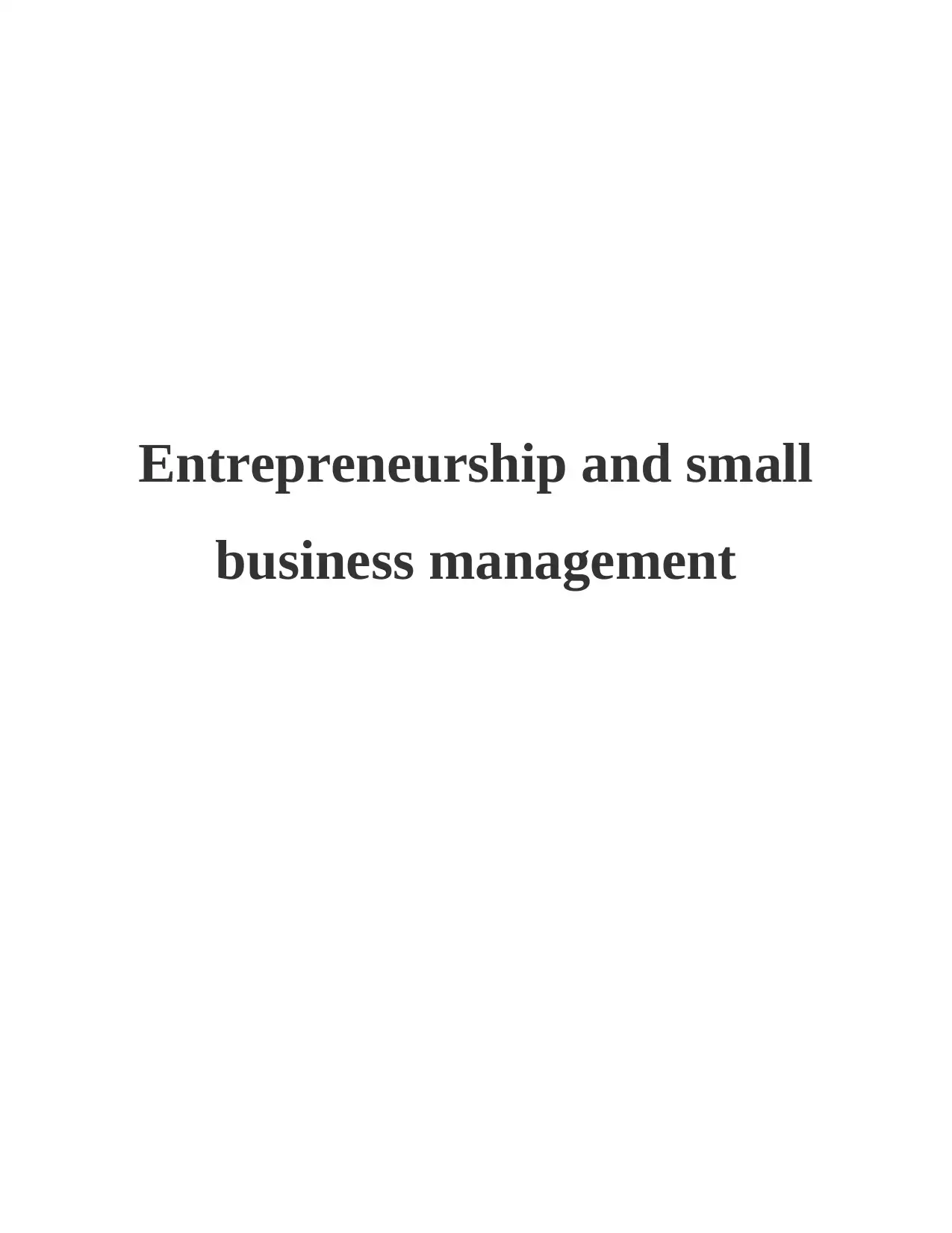
Entrepreneurship and small
business management
business management
Paraphrase This Document
Need a fresh take? Get an instant paraphrase of this document with our AI Paraphraser
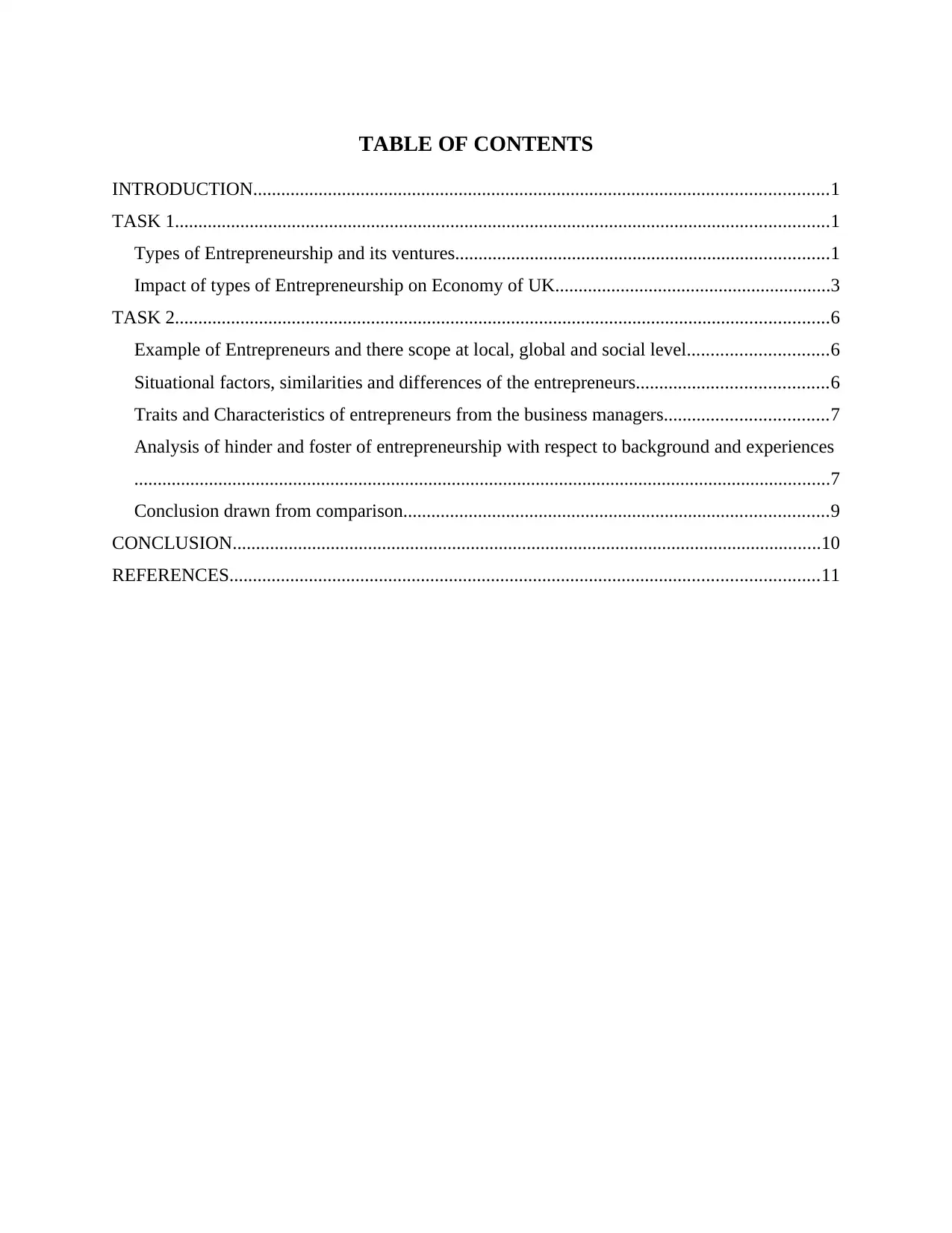
TABLE OF CONTENTS
INTRODUCTION...........................................................................................................................1
TASK 1............................................................................................................................................1
Types of Entrepreneurship and its ventures................................................................................1
Impact of types of Entrepreneurship on Economy of UK...........................................................3
TASK 2............................................................................................................................................6
Example of Entrepreneurs and there scope at local, global and social level..............................6
Situational factors, similarities and differences of the entrepreneurs.........................................6
Traits and Characteristics of entrepreneurs from the business managers...................................7
Analysis of hinder and foster of entrepreneurship with respect to background and experiences
.....................................................................................................................................................7
Conclusion drawn from comparison...........................................................................................9
CONCLUSION..............................................................................................................................10
REFERENCES..............................................................................................................................11
INTRODUCTION...........................................................................................................................1
TASK 1............................................................................................................................................1
Types of Entrepreneurship and its ventures................................................................................1
Impact of types of Entrepreneurship on Economy of UK...........................................................3
TASK 2............................................................................................................................................6
Example of Entrepreneurs and there scope at local, global and social level..............................6
Situational factors, similarities and differences of the entrepreneurs.........................................6
Traits and Characteristics of entrepreneurs from the business managers...................................7
Analysis of hinder and foster of entrepreneurship with respect to background and experiences
.....................................................................................................................................................7
Conclusion drawn from comparison...........................................................................................9
CONCLUSION..............................................................................................................................10
REFERENCES..............................................................................................................................11
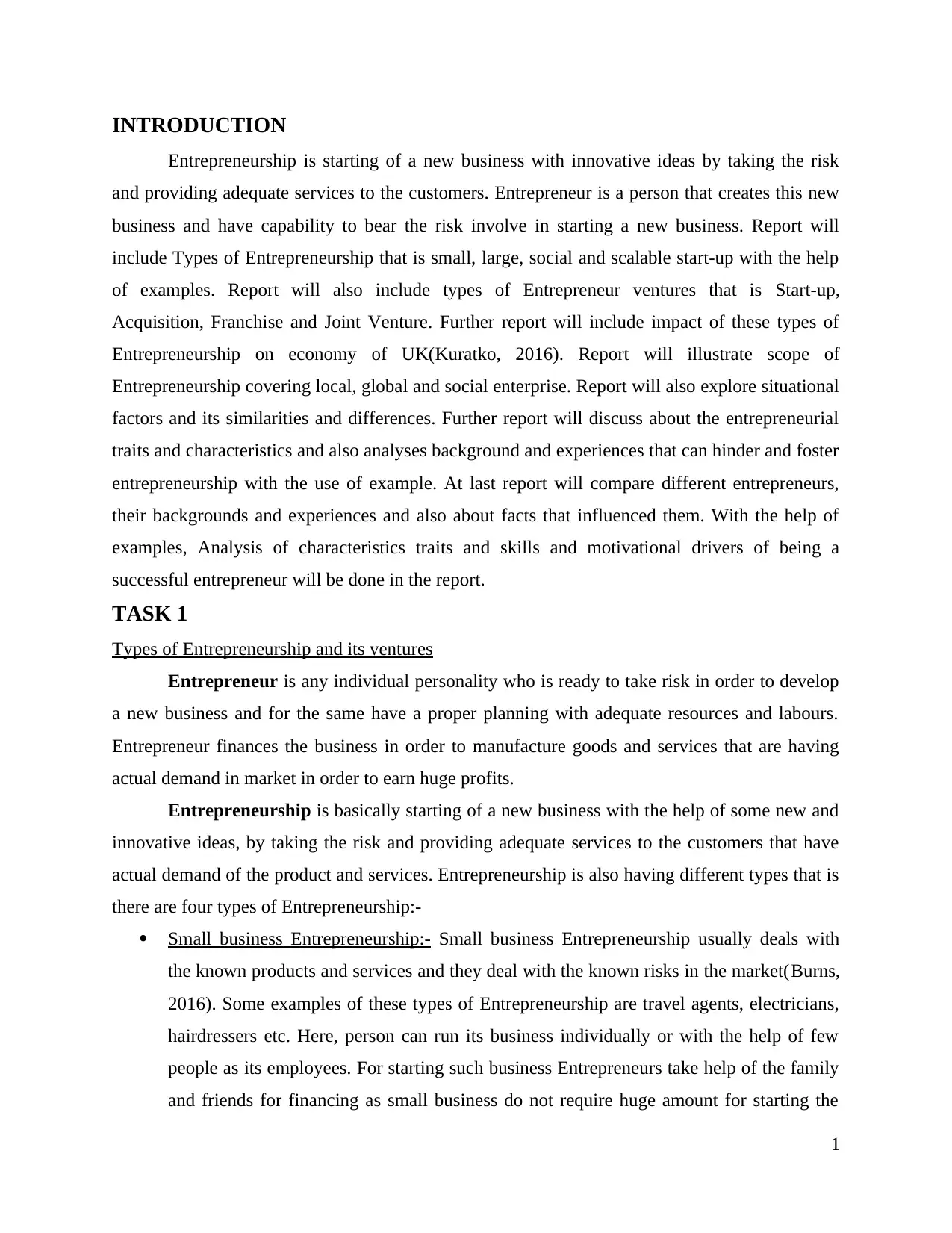
INTRODUCTION
Entrepreneurship is starting of a new business with innovative ideas by taking the risk
and providing adequate services to the customers. Entrepreneur is a person that creates this new
business and have capability to bear the risk involve in starting a new business. Report will
include Types of Entrepreneurship that is small, large, social and scalable start-up with the help
of examples. Report will also include types of Entrepreneur ventures that is Start-up,
Acquisition, Franchise and Joint Venture. Further report will include impact of these types of
Entrepreneurship on economy of UK(Kuratko, 2016). Report will illustrate scope of
Entrepreneurship covering local, global and social enterprise. Report will also explore situational
factors and its similarities and differences. Further report will discuss about the entrepreneurial
traits and characteristics and also analyses background and experiences that can hinder and foster
entrepreneurship with the use of example. At last report will compare different entrepreneurs,
their backgrounds and experiences and also about facts that influenced them. With the help of
examples, Analysis of characteristics traits and skills and motivational drivers of being a
successful entrepreneur will be done in the report.
TASK 1
Types of Entrepreneurship and its ventures
Entrepreneur is any individual personality who is ready to take risk in order to develop
a new business and for the same have a proper planning with adequate resources and labours.
Entrepreneur finances the business in order to manufacture goods and services that are having
actual demand in market in order to earn huge profits.
Entrepreneurship is basically starting of a new business with the help of some new and
innovative ideas, by taking the risk and providing adequate services to the customers that have
actual demand of the product and services. Entrepreneurship is also having different types that is
there are four types of Entrepreneurship:-
Small business Entrepreneurship:- Small business Entrepreneurship usually deals with
the known products and services and they deal with the known risks in the market(Burns,
2016). Some examples of these types of Entrepreneurship are travel agents, electricians,
hairdressers etc. Here, person can run its business individually or with the help of few
people as its employees. For starting such business Entrepreneurs take help of the family
and friends for financing as small business do not require huge amount for starting the
1
Entrepreneurship is starting of a new business with innovative ideas by taking the risk
and providing adequate services to the customers. Entrepreneur is a person that creates this new
business and have capability to bear the risk involve in starting a new business. Report will
include Types of Entrepreneurship that is small, large, social and scalable start-up with the help
of examples. Report will also include types of Entrepreneur ventures that is Start-up,
Acquisition, Franchise and Joint Venture. Further report will include impact of these types of
Entrepreneurship on economy of UK(Kuratko, 2016). Report will illustrate scope of
Entrepreneurship covering local, global and social enterprise. Report will also explore situational
factors and its similarities and differences. Further report will discuss about the entrepreneurial
traits and characteristics and also analyses background and experiences that can hinder and foster
entrepreneurship with the use of example. At last report will compare different entrepreneurs,
their backgrounds and experiences and also about facts that influenced them. With the help of
examples, Analysis of characteristics traits and skills and motivational drivers of being a
successful entrepreneur will be done in the report.
TASK 1
Types of Entrepreneurship and its ventures
Entrepreneur is any individual personality who is ready to take risk in order to develop
a new business and for the same have a proper planning with adequate resources and labours.
Entrepreneur finances the business in order to manufacture goods and services that are having
actual demand in market in order to earn huge profits.
Entrepreneurship is basically starting of a new business with the help of some new and
innovative ideas, by taking the risk and providing adequate services to the customers that have
actual demand of the product and services. Entrepreneurship is also having different types that is
there are four types of Entrepreneurship:-
Small business Entrepreneurship:- Small business Entrepreneurship usually deals with
the known products and services and they deal with the known risks in the market(Burns,
2016). Some examples of these types of Entrepreneurship are travel agents, electricians,
hairdressers etc. Here, person can run its business individually or with the help of few
people as its employees. For starting such business Entrepreneurs take help of the family
and friends for financing as small business do not require huge amount for starting the
1
⊘ This is a preview!⊘
Do you want full access?
Subscribe today to unlock all pages.

Trusted by 1+ million students worldwide
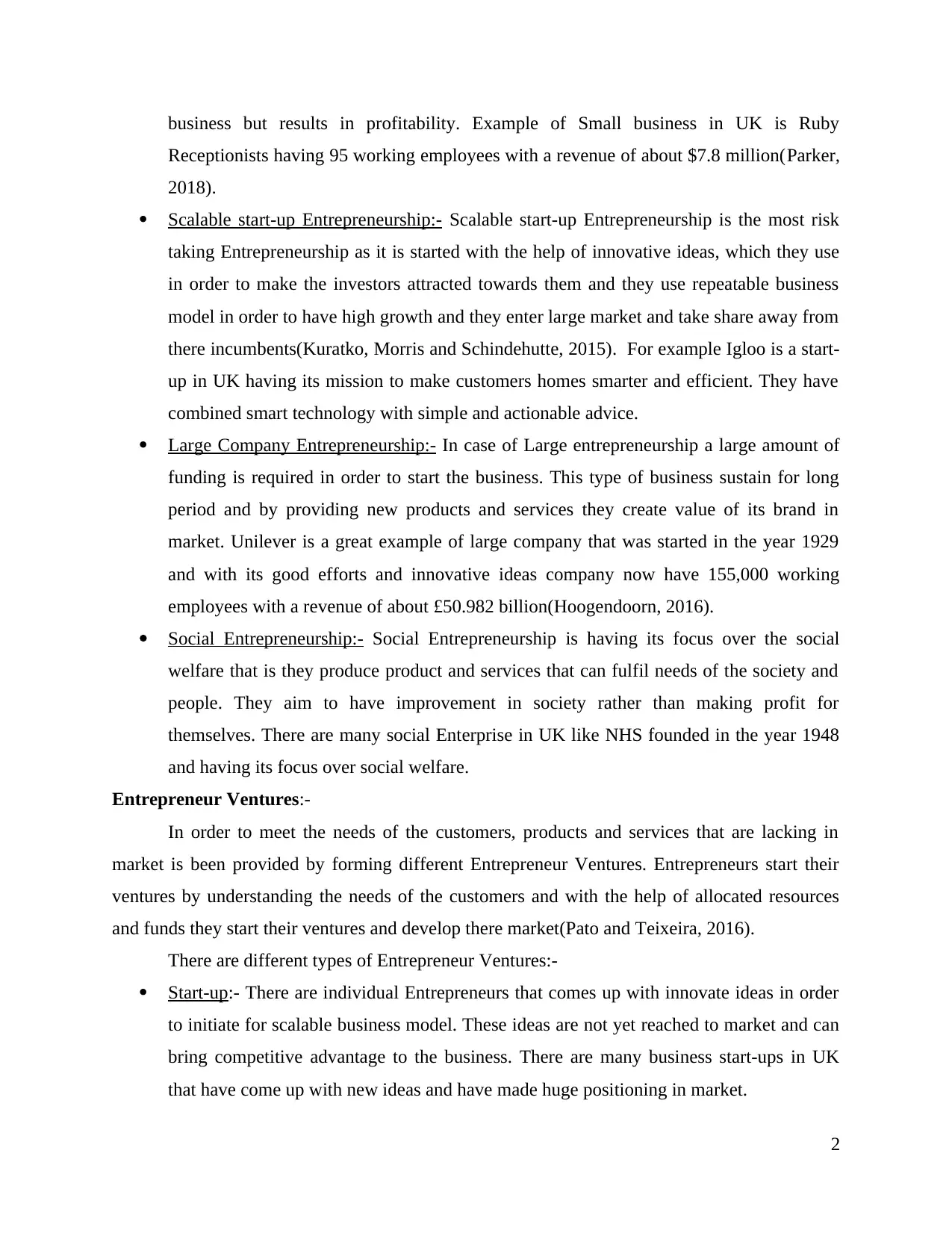
business but results in profitability. Example of Small business in UK is Ruby
Receptionists having 95 working employees with a revenue of about $7.8 million(Parker,
2018).
Scalable start-up Entrepreneurship:- Scalable start-up Entrepreneurship is the most risk
taking Entrepreneurship as it is started with the help of innovative ideas, which they use
in order to make the investors attracted towards them and they use repeatable business
model in order to have high growth and they enter large market and take share away from
there incumbents(Kuratko, Morris and Schindehutte, 2015). For example Igloo is a start-
up in UK having its mission to make customers homes smarter and efficient. They have
combined smart technology with simple and actionable advice.
Large Company Entrepreneurship:- In case of Large entrepreneurship a large amount of
funding is required in order to start the business. This type of business sustain for long
period and by providing new products and services they create value of its brand in
market. Unilever is a great example of large company that was started in the year 1929
and with its good efforts and innovative ideas company now have 155,000 working
employees with a revenue of about £50.982 billion(Hoogendoorn, 2016).
Social Entrepreneurship:- Social Entrepreneurship is having its focus over the social
welfare that is they produce product and services that can fulfil needs of the society and
people. They aim to have improvement in society rather than making profit for
themselves. There are many social Enterprise in UK like NHS founded in the year 1948
and having its focus over social welfare.
Entrepreneur Ventures:-
In order to meet the needs of the customers, products and services that are lacking in
market is been provided by forming different Entrepreneur Ventures. Entrepreneurs start their
ventures by understanding the needs of the customers and with the help of allocated resources
and funds they start their ventures and develop there market(Pato and Teixeira, 2016).
There are different types of Entrepreneur Ventures:-
Start-up:- There are individual Entrepreneurs that comes up with innovate ideas in order
to initiate for scalable business model. These ideas are not yet reached to market and can
bring competitive advantage to the business. There are many business start-ups in UK
that have come up with new ideas and have made huge positioning in market.
2
Receptionists having 95 working employees with a revenue of about $7.8 million(Parker,
2018).
Scalable start-up Entrepreneurship:- Scalable start-up Entrepreneurship is the most risk
taking Entrepreneurship as it is started with the help of innovative ideas, which they use
in order to make the investors attracted towards them and they use repeatable business
model in order to have high growth and they enter large market and take share away from
there incumbents(Kuratko, Morris and Schindehutte, 2015). For example Igloo is a start-
up in UK having its mission to make customers homes smarter and efficient. They have
combined smart technology with simple and actionable advice.
Large Company Entrepreneurship:- In case of Large entrepreneurship a large amount of
funding is required in order to start the business. This type of business sustain for long
period and by providing new products and services they create value of its brand in
market. Unilever is a great example of large company that was started in the year 1929
and with its good efforts and innovative ideas company now have 155,000 working
employees with a revenue of about £50.982 billion(Hoogendoorn, 2016).
Social Entrepreneurship:- Social Entrepreneurship is having its focus over the social
welfare that is they produce product and services that can fulfil needs of the society and
people. They aim to have improvement in society rather than making profit for
themselves. There are many social Enterprise in UK like NHS founded in the year 1948
and having its focus over social welfare.
Entrepreneur Ventures:-
In order to meet the needs of the customers, products and services that are lacking in
market is been provided by forming different Entrepreneur Ventures. Entrepreneurs start their
ventures by understanding the needs of the customers and with the help of allocated resources
and funds they start their ventures and develop there market(Pato and Teixeira, 2016).
There are different types of Entrepreneur Ventures:-
Start-up:- There are individual Entrepreneurs that comes up with innovate ideas in order
to initiate for scalable business model. These ideas are not yet reached to market and can
bring competitive advantage to the business. There are many business start-ups in UK
that have come up with new ideas and have made huge positioning in market.
2
Paraphrase This Document
Need a fresh take? Get an instant paraphrase of this document with our AI Paraphraser
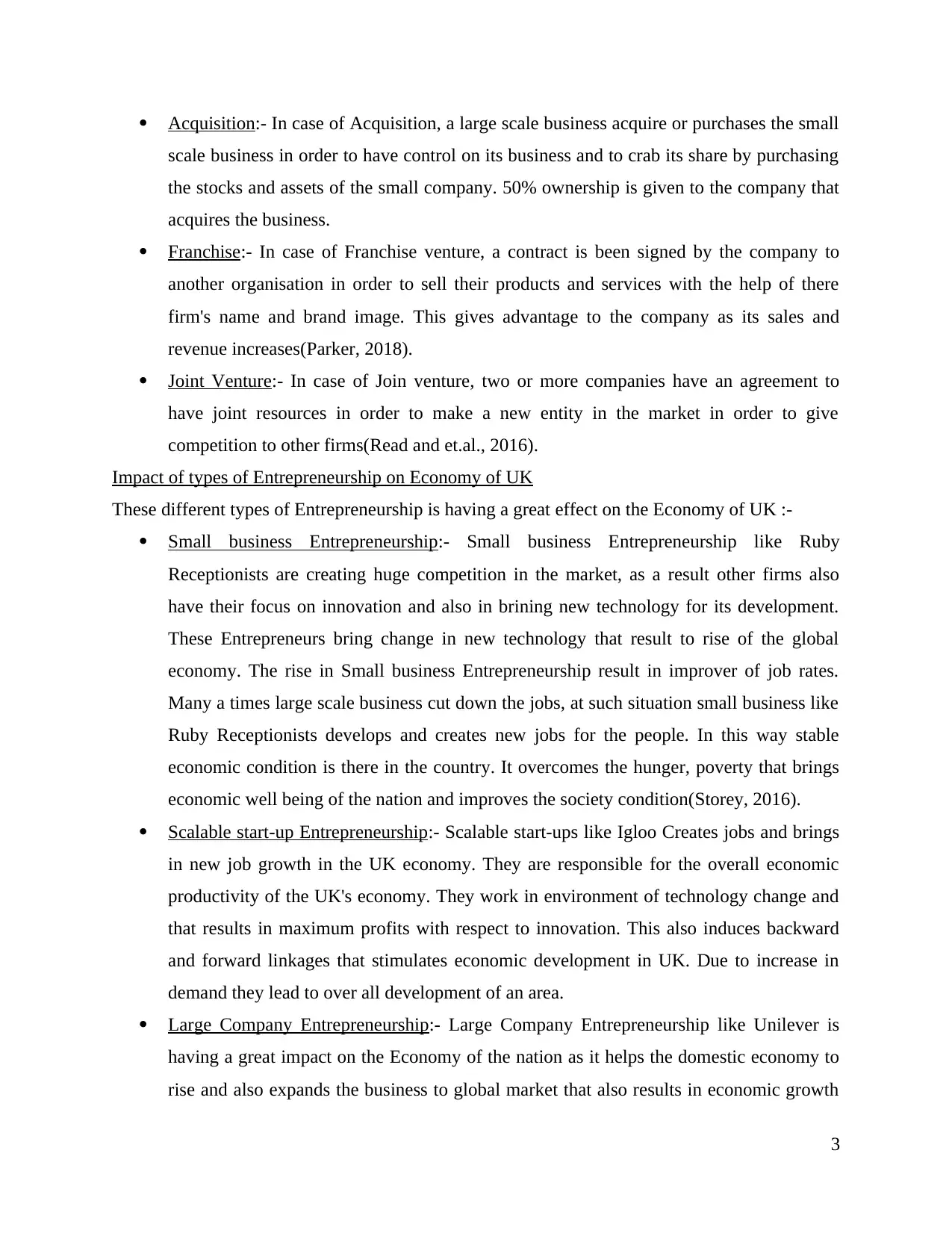
Acquisition:- In case of Acquisition, a large scale business acquire or purchases the small
scale business in order to have control on its business and to crab its share by purchasing
the stocks and assets of the small company. 50% ownership is given to the company that
acquires the business.
Franchise:- In case of Franchise venture, a contract is been signed by the company to
another organisation in order to sell their products and services with the help of there
firm's name and brand image. This gives advantage to the company as its sales and
revenue increases(Parker, 2018).
Joint Venture:- In case of Join venture, two or more companies have an agreement to
have joint resources in order to make a new entity in the market in order to give
competition to other firms(Read and et.al., 2016).
Impact of types of Entrepreneurship on Economy of UK
These different types of Entrepreneurship is having a great effect on the Economy of UK :-
Small business Entrepreneurship:- Small business Entrepreneurship like Ruby
Receptionists are creating huge competition in the market, as a result other firms also
have their focus on innovation and also in brining new technology for its development.
These Entrepreneurs bring change in new technology that result to rise of the global
economy. The rise in Small business Entrepreneurship result in improver of job rates.
Many a times large scale business cut down the jobs, at such situation small business like
Ruby Receptionists develops and creates new jobs for the people. In this way stable
economic condition is there in the country. It overcomes the hunger, poverty that brings
economic well being of the nation and improves the society condition(Storey, 2016).
Scalable start-up Entrepreneurship:- Scalable start-ups like Igloo Creates jobs and brings
in new job growth in the UK economy. They are responsible for the overall economic
productivity of the UK's economy. They work in environment of technology change and
that results in maximum profits with respect to innovation. This also induces backward
and forward linkages that stimulates economic development in UK. Due to increase in
demand they lead to over all development of an area.
Large Company Entrepreneurship:- Large Company Entrepreneurship like Unilever is
having a great impact on the Economy of the nation as it helps the domestic economy to
rise and also expands the business to global market that also results in economic growth
3
scale business in order to have control on its business and to crab its share by purchasing
the stocks and assets of the small company. 50% ownership is given to the company that
acquires the business.
Franchise:- In case of Franchise venture, a contract is been signed by the company to
another organisation in order to sell their products and services with the help of there
firm's name and brand image. This gives advantage to the company as its sales and
revenue increases(Parker, 2018).
Joint Venture:- In case of Join venture, two or more companies have an agreement to
have joint resources in order to make a new entity in the market in order to give
competition to other firms(Read and et.al., 2016).
Impact of types of Entrepreneurship on Economy of UK
These different types of Entrepreneurship is having a great effect on the Economy of UK :-
Small business Entrepreneurship:- Small business Entrepreneurship like Ruby
Receptionists are creating huge competition in the market, as a result other firms also
have their focus on innovation and also in brining new technology for its development.
These Entrepreneurs bring change in new technology that result to rise of the global
economy. The rise in Small business Entrepreneurship result in improver of job rates.
Many a times large scale business cut down the jobs, at such situation small business like
Ruby Receptionists develops and creates new jobs for the people. In this way stable
economic condition is there in the country. It overcomes the hunger, poverty that brings
economic well being of the nation and improves the society condition(Storey, 2016).
Scalable start-up Entrepreneurship:- Scalable start-ups like Igloo Creates jobs and brings
in new job growth in the UK economy. They are responsible for the overall economic
productivity of the UK's economy. They work in environment of technology change and
that results in maximum profits with respect to innovation. This also induces backward
and forward linkages that stimulates economic development in UK. Due to increase in
demand they lead to over all development of an area.
Large Company Entrepreneurship:- Large Company Entrepreneurship like Unilever is
having a great impact on the Economy of the nation as it helps the domestic economy to
rise and also expands the business to global market that also results in economic growth
3
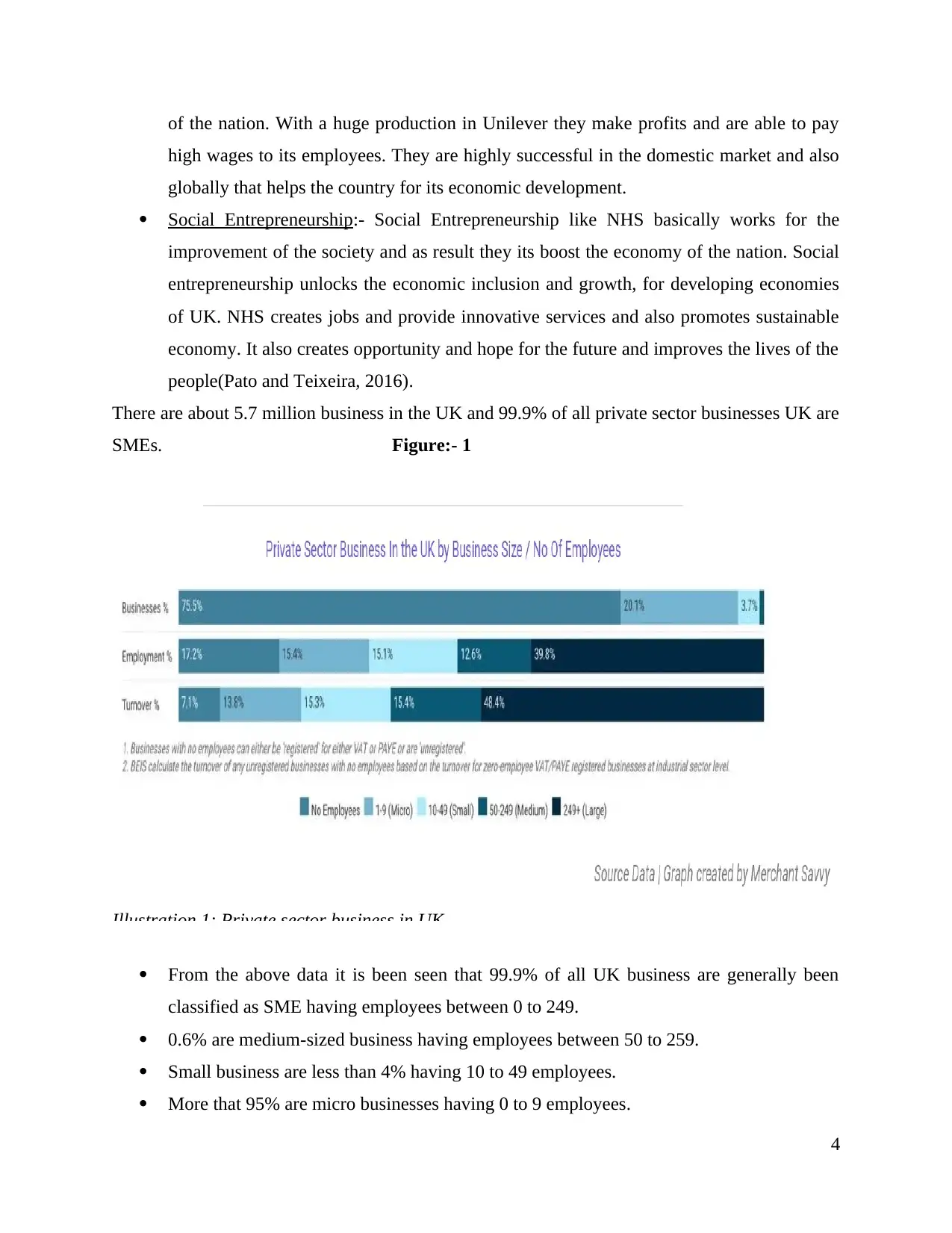
of the nation. With a huge production in Unilever they make profits and are able to pay
high wages to its employees. They are highly successful in the domestic market and also
globally that helps the country for its economic development.
Social Entrepreneurship:- Social Entrepreneurship like NHS basically works for the
improvement of the society and as result they its boost the economy of the nation. Social
entrepreneurship unlocks the economic inclusion and growth, for developing economies
of UK. NHS creates jobs and provide innovative services and also promotes sustainable
economy. It also creates opportunity and hope for the future and improves the lives of the
people(Pato and Teixeira, 2016).
There are about 5.7 million business in the UK and 99.9% of all private sector businesses UK are
SMEs. Figure:- 1
From the above data it is been seen that 99.9% of all UK business are generally been
classified as SME having employees between 0 to 249.
0.6% are medium-sized business having employees between 50 to 259.
Small business are less than 4% having 10 to 49 employees.
More that 95% are micro businesses having 0 to 9 employees.
4
Illustration 1: Private sector business in UK
high wages to its employees. They are highly successful in the domestic market and also
globally that helps the country for its economic development.
Social Entrepreneurship:- Social Entrepreneurship like NHS basically works for the
improvement of the society and as result they its boost the economy of the nation. Social
entrepreneurship unlocks the economic inclusion and growth, for developing economies
of UK. NHS creates jobs and provide innovative services and also promotes sustainable
economy. It also creates opportunity and hope for the future and improves the lives of the
people(Pato and Teixeira, 2016).
There are about 5.7 million business in the UK and 99.9% of all private sector businesses UK are
SMEs. Figure:- 1
From the above data it is been seen that 99.9% of all UK business are generally been
classified as SME having employees between 0 to 249.
0.6% are medium-sized business having employees between 50 to 259.
Small business are less than 4% having 10 to 49 employees.
More that 95% are micro businesses having 0 to 9 employees.
4
Illustration 1: Private sector business in UK
⊘ This is a preview!⊘
Do you want full access?
Subscribe today to unlock all pages.

Trusted by 1+ million students worldwide
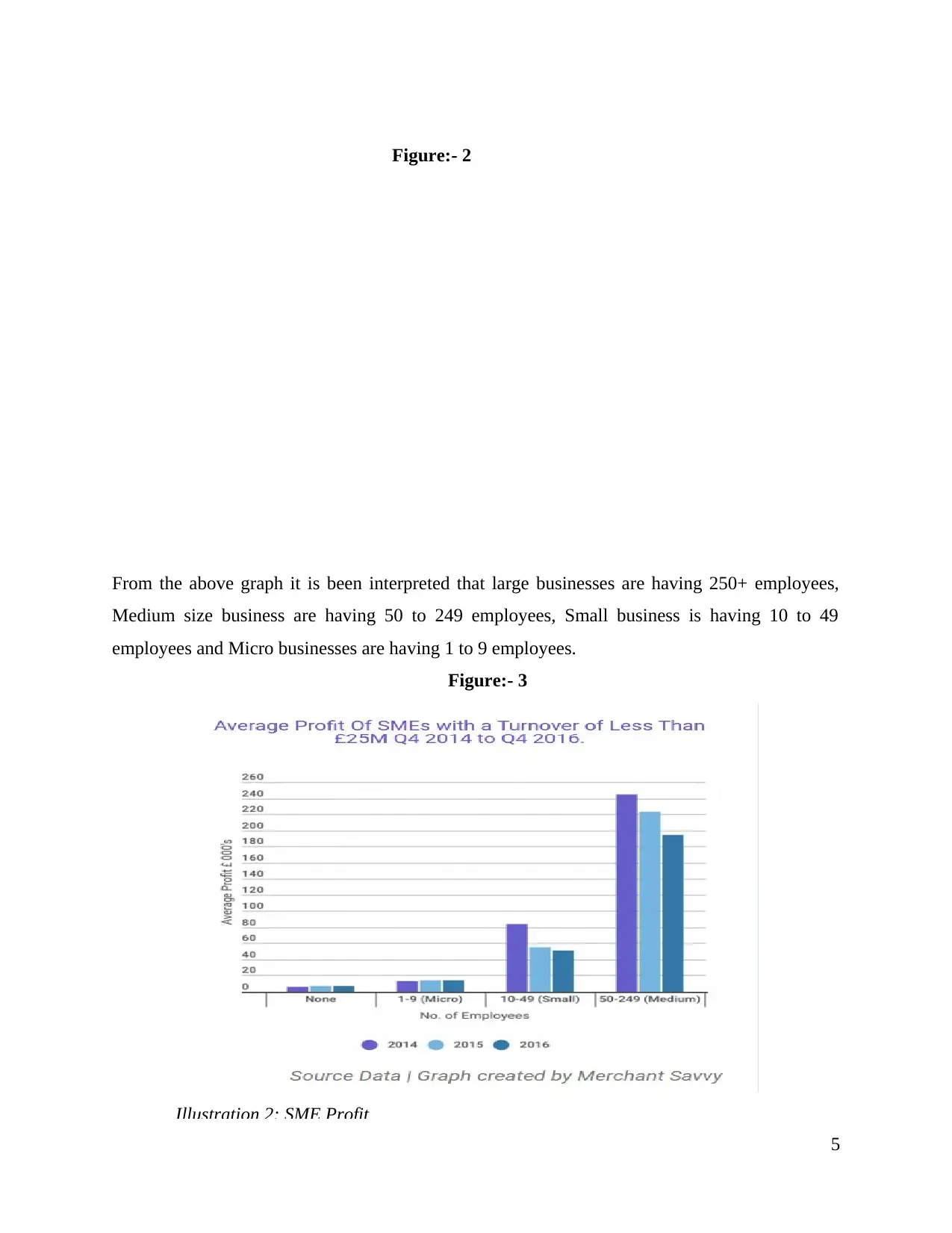
Figure:- 2
From the above graph it is been interpreted that large businesses are having 250+ employees,
Medium size business are having 50 to 249 employees, Small business is having 10 to 49
employees and Micro businesses are having 1 to 9 employees.
Figure:- 3
5
Illustration 2: SME Profit
From the above graph it is been interpreted that large businesses are having 250+ employees,
Medium size business are having 50 to 249 employees, Small business is having 10 to 49
employees and Micro businesses are having 1 to 9 employees.
Figure:- 3
5
Illustration 2: SME Profit
Paraphrase This Document
Need a fresh take? Get an instant paraphrase of this document with our AI Paraphraser
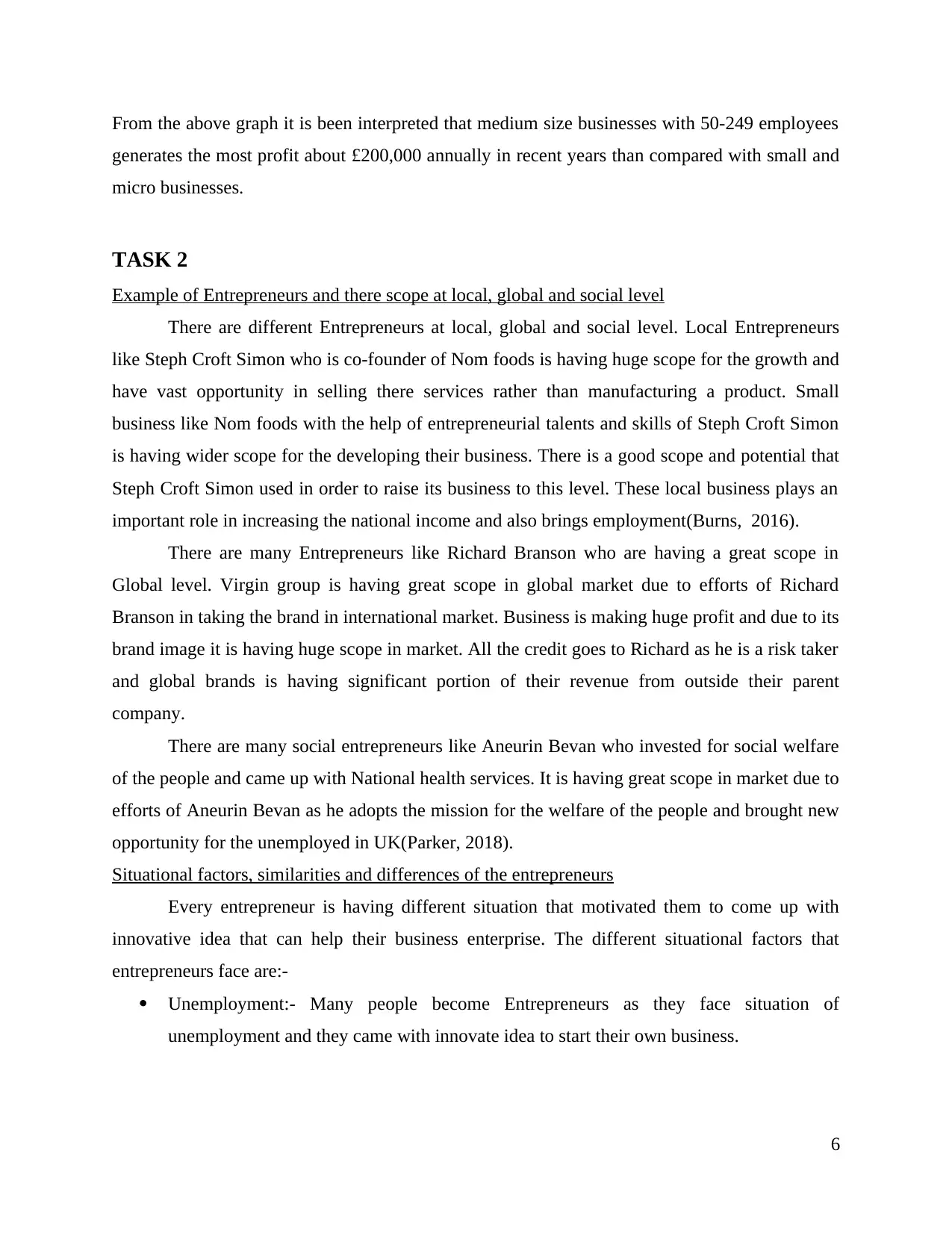
From the above graph it is been interpreted that medium size businesses with 50-249 employees
generates the most profit about £200,000 annually in recent years than compared with small and
micro businesses.
TASK 2
Example of Entrepreneurs and there scope at local, global and social level
There are different Entrepreneurs at local, global and social level. Local Entrepreneurs
like Steph Croft Simon who is co-founder of Nom foods is having huge scope for the growth and
have vast opportunity in selling there services rather than manufacturing a product. Small
business like Nom foods with the help of entrepreneurial talents and skills of Steph Croft Simon
is having wider scope for the developing their business. There is a good scope and potential that
Steph Croft Simon used in order to raise its business to this level. These local business plays an
important role in increasing the national income and also brings employment(Burns, 2016).
There are many Entrepreneurs like Richard Branson who are having a great scope in
Global level. Virgin group is having great scope in global market due to efforts of Richard
Branson in taking the brand in international market. Business is making huge profit and due to its
brand image it is having huge scope in market. All the credit goes to Richard as he is a risk taker
and global brands is having significant portion of their revenue from outside their parent
company.
There are many social entrepreneurs like Aneurin Bevan who invested for social welfare
of the people and came up with National health services. It is having great scope in market due to
efforts of Aneurin Bevan as he adopts the mission for the welfare of the people and brought new
opportunity for the unemployed in UK(Parker, 2018).
Situational factors, similarities and differences of the entrepreneurs
Every entrepreneur is having different situation that motivated them to come up with
innovative idea that can help their business enterprise. The different situational factors that
entrepreneurs face are:-
Unemployment:- Many people become Entrepreneurs as they face situation of
unemployment and they came with innovate idea to start their own business.
6
generates the most profit about £200,000 annually in recent years than compared with small and
micro businesses.
TASK 2
Example of Entrepreneurs and there scope at local, global and social level
There are different Entrepreneurs at local, global and social level. Local Entrepreneurs
like Steph Croft Simon who is co-founder of Nom foods is having huge scope for the growth and
have vast opportunity in selling there services rather than manufacturing a product. Small
business like Nom foods with the help of entrepreneurial talents and skills of Steph Croft Simon
is having wider scope for the developing their business. There is a good scope and potential that
Steph Croft Simon used in order to raise its business to this level. These local business plays an
important role in increasing the national income and also brings employment(Burns, 2016).
There are many Entrepreneurs like Richard Branson who are having a great scope in
Global level. Virgin group is having great scope in global market due to efforts of Richard
Branson in taking the brand in international market. Business is making huge profit and due to its
brand image it is having huge scope in market. All the credit goes to Richard as he is a risk taker
and global brands is having significant portion of their revenue from outside their parent
company.
There are many social entrepreneurs like Aneurin Bevan who invested for social welfare
of the people and came up with National health services. It is having great scope in market due to
efforts of Aneurin Bevan as he adopts the mission for the welfare of the people and brought new
opportunity for the unemployed in UK(Parker, 2018).
Situational factors, similarities and differences of the entrepreneurs
Every entrepreneur is having different situation that motivated them to come up with
innovative idea that can help their business enterprise. The different situational factors that
entrepreneurs face are:-
Unemployment:- Many people become Entrepreneurs as they face situation of
unemployment and they came with innovate idea to start their own business.
6
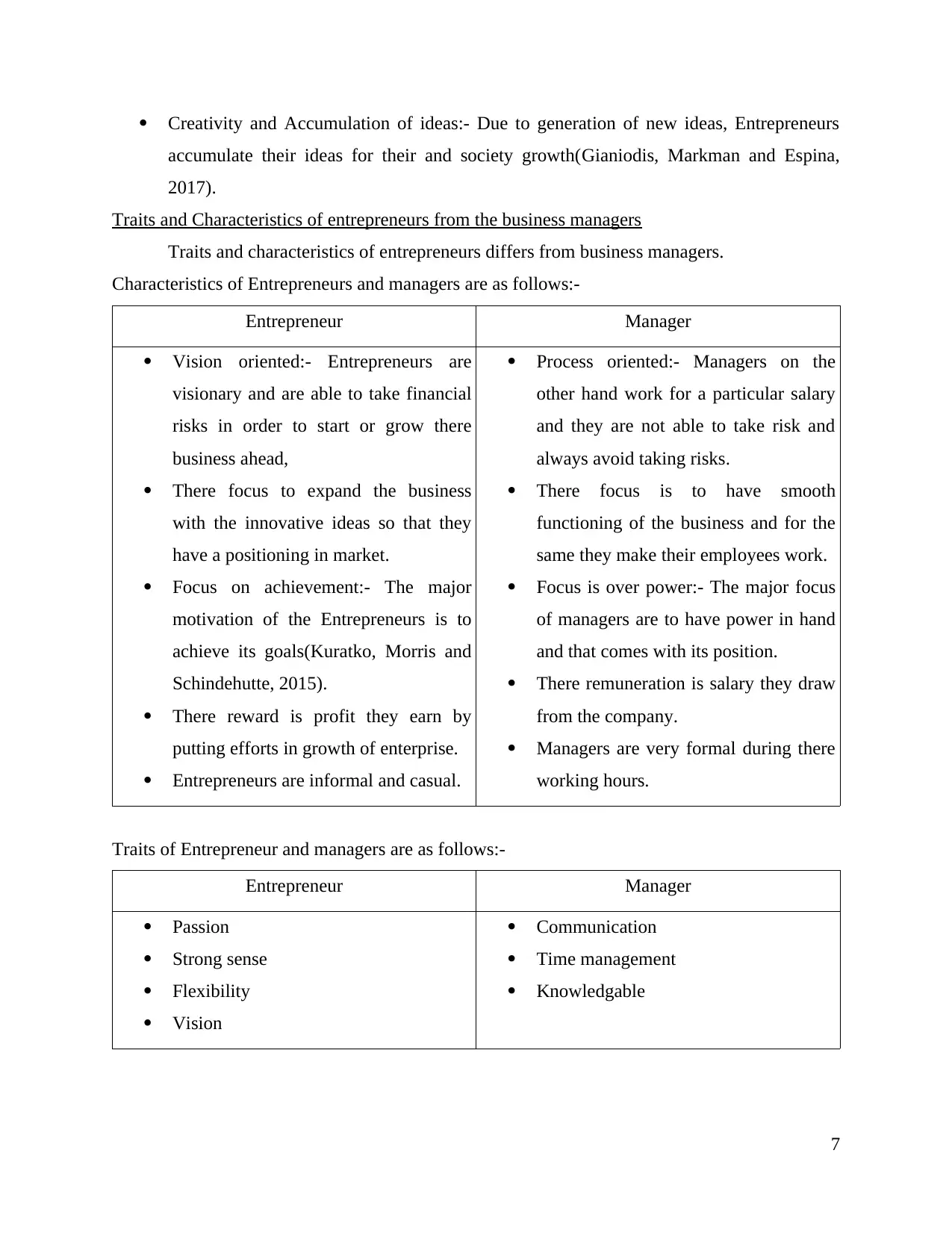
Creativity and Accumulation of ideas:- Due to generation of new ideas, Entrepreneurs
accumulate their ideas for their and society growth(Gianiodis, Markman and Espina,
2017).
Traits and Characteristics of entrepreneurs from the business managers
Traits and characteristics of entrepreneurs differs from business managers.
Characteristics of Entrepreneurs and managers are as follows:-
Entrepreneur Manager
Vision oriented:- Entrepreneurs are
visionary and are able to take financial
risks in order to start or grow there
business ahead,
There focus to expand the business
with the innovative ideas so that they
have a positioning in market.
Focus on achievement:- The major
motivation of the Entrepreneurs is to
achieve its goals(Kuratko, Morris and
Schindehutte, 2015).
There reward is profit they earn by
putting efforts in growth of enterprise.
Entrepreneurs are informal and casual.
Process oriented:- Managers on the
other hand work for a particular salary
and they are not able to take risk and
always avoid taking risks.
There focus is to have smooth
functioning of the business and for the
same they make their employees work.
Focus is over power:- The major focus
of managers are to have power in hand
and that comes with its position.
There remuneration is salary they draw
from the company.
Managers are very formal during there
working hours.
Traits of Entrepreneur and managers are as follows:-
Entrepreneur Manager
Passion
Strong sense
Flexibility
Vision
Communication
Time management
Knowledgable
7
accumulate their ideas for their and society growth(Gianiodis, Markman and Espina,
2017).
Traits and Characteristics of entrepreneurs from the business managers
Traits and characteristics of entrepreneurs differs from business managers.
Characteristics of Entrepreneurs and managers are as follows:-
Entrepreneur Manager
Vision oriented:- Entrepreneurs are
visionary and are able to take financial
risks in order to start or grow there
business ahead,
There focus to expand the business
with the innovative ideas so that they
have a positioning in market.
Focus on achievement:- The major
motivation of the Entrepreneurs is to
achieve its goals(Kuratko, Morris and
Schindehutte, 2015).
There reward is profit they earn by
putting efforts in growth of enterprise.
Entrepreneurs are informal and casual.
Process oriented:- Managers on the
other hand work for a particular salary
and they are not able to take risk and
always avoid taking risks.
There focus is to have smooth
functioning of the business and for the
same they make their employees work.
Focus is over power:- The major focus
of managers are to have power in hand
and that comes with its position.
There remuneration is salary they draw
from the company.
Managers are very formal during there
working hours.
Traits of Entrepreneur and managers are as follows:-
Entrepreneur Manager
Passion
Strong sense
Flexibility
Vision
Communication
Time management
Knowledgable
7
⊘ This is a preview!⊘
Do you want full access?
Subscribe today to unlock all pages.

Trusted by 1+ million students worldwide
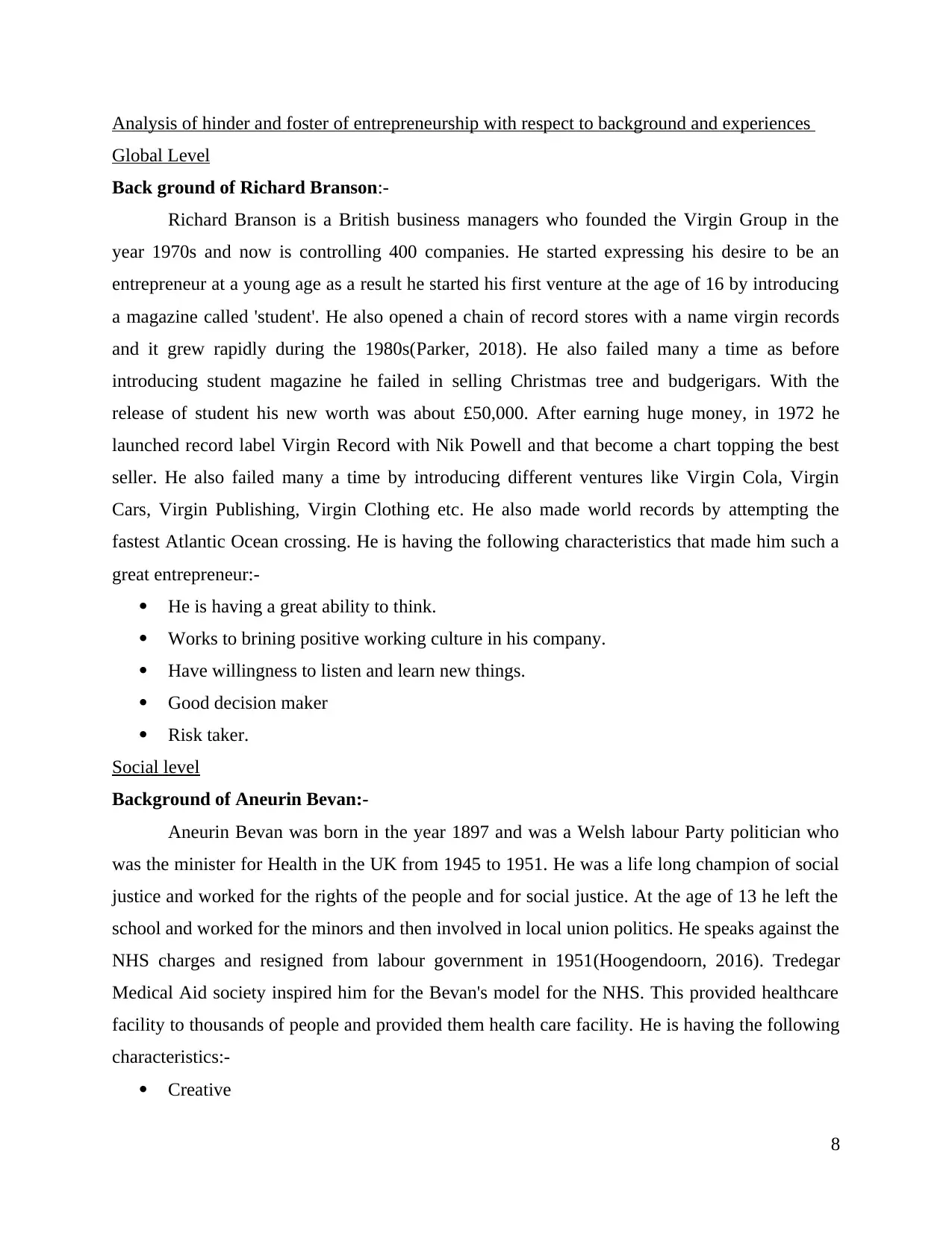
Analysis of hinder and foster of entrepreneurship with respect to background and experiences
Global Level
Back ground of Richard Branson:-
Richard Branson is a British business managers who founded the Virgin Group in the
year 1970s and now is controlling 400 companies. He started expressing his desire to be an
entrepreneur at a young age as a result he started his first venture at the age of 16 by introducing
a magazine called 'student'. He also opened a chain of record stores with a name virgin records
and it grew rapidly during the 1980s(Parker, 2018). He also failed many a time as before
introducing student magazine he failed in selling Christmas tree and budgerigars. With the
release of student his new worth was about £50,000. After earning huge money, in 1972 he
launched record label Virgin Record with Nik Powell and that become a chart topping the best
seller. He also failed many a time by introducing different ventures like Virgin Cola, Virgin
Cars, Virgin Publishing, Virgin Clothing etc. He also made world records by attempting the
fastest Atlantic Ocean crossing. He is having the following characteristics that made him such a
great entrepreneur:-
He is having a great ability to think.
Works to brining positive working culture in his company.
Have willingness to listen and learn new things.
Good decision maker
Risk taker.
Social level
Background of Aneurin Bevan:-
Aneurin Bevan was born in the year 1897 and was a Welsh labour Party politician who
was the minister for Health in the UK from 1945 to 1951. He was a life long champion of social
justice and worked for the rights of the people and for social justice. At the age of 13 he left the
school and worked for the minors and then involved in local union politics. He speaks against the
NHS charges and resigned from labour government in 1951(Hoogendoorn, 2016). Tredegar
Medical Aid society inspired him for the Bevan's model for the NHS. This provided healthcare
facility to thousands of people and provided them health care facility. He is having the following
characteristics:-
Creative
8
Global Level
Back ground of Richard Branson:-
Richard Branson is a British business managers who founded the Virgin Group in the
year 1970s and now is controlling 400 companies. He started expressing his desire to be an
entrepreneur at a young age as a result he started his first venture at the age of 16 by introducing
a magazine called 'student'. He also opened a chain of record stores with a name virgin records
and it grew rapidly during the 1980s(Parker, 2018). He also failed many a time as before
introducing student magazine he failed in selling Christmas tree and budgerigars. With the
release of student his new worth was about £50,000. After earning huge money, in 1972 he
launched record label Virgin Record with Nik Powell and that become a chart topping the best
seller. He also failed many a time by introducing different ventures like Virgin Cola, Virgin
Cars, Virgin Publishing, Virgin Clothing etc. He also made world records by attempting the
fastest Atlantic Ocean crossing. He is having the following characteristics that made him such a
great entrepreneur:-
He is having a great ability to think.
Works to brining positive working culture in his company.
Have willingness to listen and learn new things.
Good decision maker
Risk taker.
Social level
Background of Aneurin Bevan:-
Aneurin Bevan was born in the year 1897 and was a Welsh labour Party politician who
was the minister for Health in the UK from 1945 to 1951. He was a life long champion of social
justice and worked for the rights of the people and for social justice. At the age of 13 he left the
school and worked for the minors and then involved in local union politics. He speaks against the
NHS charges and resigned from labour government in 1951(Hoogendoorn, 2016). Tredegar
Medical Aid society inspired him for the Bevan's model for the NHS. This provided healthcare
facility to thousands of people and provided them health care facility. He is having the following
characteristics:-
Creative
8
Paraphrase This Document
Need a fresh take? Get an instant paraphrase of this document with our AI Paraphraser
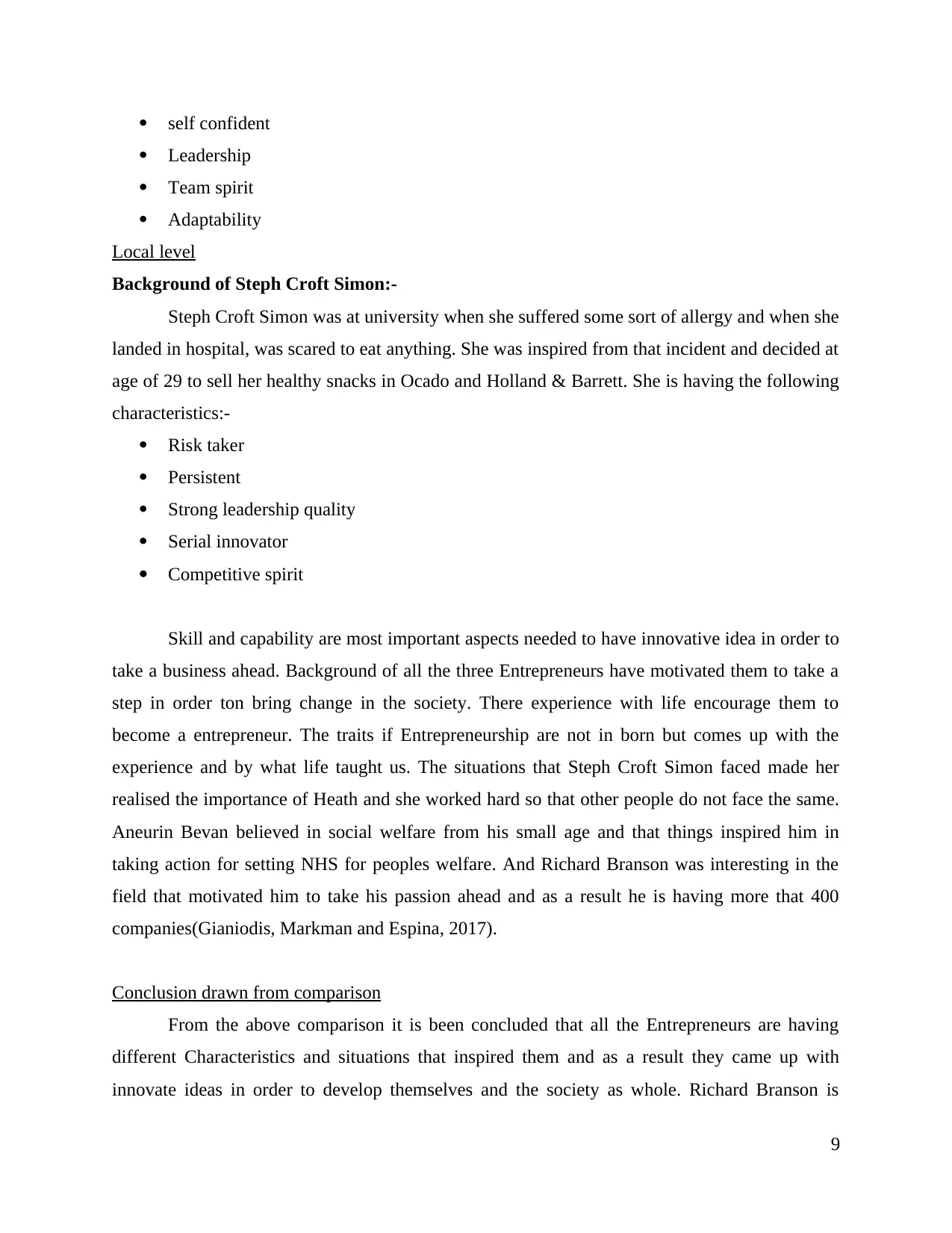
self confident
Leadership
Team spirit
Adaptability
Local level
Background of Steph Croft Simon:-
Steph Croft Simon was at university when she suffered some sort of allergy and when she
landed in hospital, was scared to eat anything. She was inspired from that incident and decided at
age of 29 to sell her healthy snacks in Ocado and Holland & Barrett. She is having the following
characteristics:-
Risk taker
Persistent
Strong leadership quality
Serial innovator
Competitive spirit
Skill and capability are most important aspects needed to have innovative idea in order to
take a business ahead. Background of all the three Entrepreneurs have motivated them to take a
step in order ton bring change in the society. There experience with life encourage them to
become a entrepreneur. The traits if Entrepreneurship are not in born but comes up with the
experience and by what life taught us. The situations that Steph Croft Simon faced made her
realised the importance of Heath and she worked hard so that other people do not face the same.
Aneurin Bevan believed in social welfare from his small age and that things inspired him in
taking action for setting NHS for peoples welfare. And Richard Branson was interesting in the
field that motivated him to take his passion ahead and as a result he is having more that 400
companies(Gianiodis, Markman and Espina, 2017).
Conclusion drawn from comparison
From the above comparison it is been concluded that all the Entrepreneurs are having
different Characteristics and situations that inspired them and as a result they came up with
innovate ideas in order to develop themselves and the society as whole. Richard Branson is
9
Leadership
Team spirit
Adaptability
Local level
Background of Steph Croft Simon:-
Steph Croft Simon was at university when she suffered some sort of allergy and when she
landed in hospital, was scared to eat anything. She was inspired from that incident and decided at
age of 29 to sell her healthy snacks in Ocado and Holland & Barrett. She is having the following
characteristics:-
Risk taker
Persistent
Strong leadership quality
Serial innovator
Competitive spirit
Skill and capability are most important aspects needed to have innovative idea in order to
take a business ahead. Background of all the three Entrepreneurs have motivated them to take a
step in order ton bring change in the society. There experience with life encourage them to
become a entrepreneur. The traits if Entrepreneurship are not in born but comes up with the
experience and by what life taught us. The situations that Steph Croft Simon faced made her
realised the importance of Heath and she worked hard so that other people do not face the same.
Aneurin Bevan believed in social welfare from his small age and that things inspired him in
taking action for setting NHS for peoples welfare. And Richard Branson was interesting in the
field that motivated him to take his passion ahead and as a result he is having more that 400
companies(Gianiodis, Markman and Espina, 2017).
Conclusion drawn from comparison
From the above comparison it is been concluded that all the Entrepreneurs are having
different Characteristics and situations that inspired them and as a result they came up with
innovate ideas in order to develop themselves and the society as whole. Richard Branson is
9
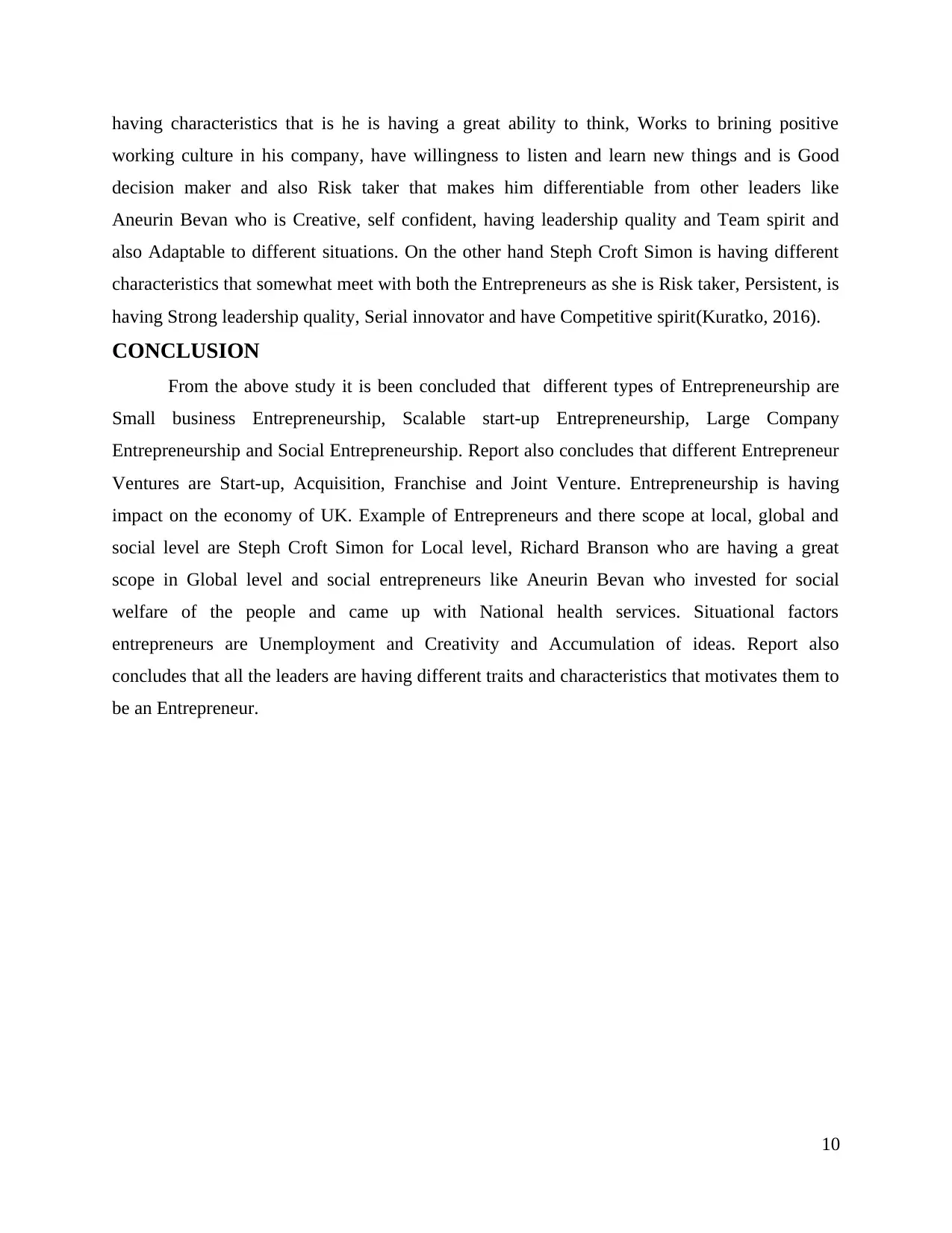
having characteristics that is he is having a great ability to think, Works to brining positive
working culture in his company, have willingness to listen and learn new things and is Good
decision maker and also Risk taker that makes him differentiable from other leaders like
Aneurin Bevan who is Creative, self confident, having leadership quality and Team spirit and
also Adaptable to different situations. On the other hand Steph Croft Simon is having different
characteristics that somewhat meet with both the Entrepreneurs as she is Risk taker, Persistent, is
having Strong leadership quality, Serial innovator and have Competitive spirit(Kuratko, 2016).
CONCLUSION
From the above study it is been concluded that different types of Entrepreneurship are
Small business Entrepreneurship, Scalable start-up Entrepreneurship, Large Company
Entrepreneurship and Social Entrepreneurship. Report also concludes that different Entrepreneur
Ventures are Start-up, Acquisition, Franchise and Joint Venture. Entrepreneurship is having
impact on the economy of UK. Example of Entrepreneurs and there scope at local, global and
social level are Steph Croft Simon for Local level, Richard Branson who are having a great
scope in Global level and social entrepreneurs like Aneurin Bevan who invested for social
welfare of the people and came up with National health services. Situational factors
entrepreneurs are Unemployment and Creativity and Accumulation of ideas. Report also
concludes that all the leaders are having different traits and characteristics that motivates them to
be an Entrepreneur.
10
working culture in his company, have willingness to listen and learn new things and is Good
decision maker and also Risk taker that makes him differentiable from other leaders like
Aneurin Bevan who is Creative, self confident, having leadership quality and Team spirit and
also Adaptable to different situations. On the other hand Steph Croft Simon is having different
characteristics that somewhat meet with both the Entrepreneurs as she is Risk taker, Persistent, is
having Strong leadership quality, Serial innovator and have Competitive spirit(Kuratko, 2016).
CONCLUSION
From the above study it is been concluded that different types of Entrepreneurship are
Small business Entrepreneurship, Scalable start-up Entrepreneurship, Large Company
Entrepreneurship and Social Entrepreneurship. Report also concludes that different Entrepreneur
Ventures are Start-up, Acquisition, Franchise and Joint Venture. Entrepreneurship is having
impact on the economy of UK. Example of Entrepreneurs and there scope at local, global and
social level are Steph Croft Simon for Local level, Richard Branson who are having a great
scope in Global level and social entrepreneurs like Aneurin Bevan who invested for social
welfare of the people and came up with National health services. Situational factors
entrepreneurs are Unemployment and Creativity and Accumulation of ideas. Report also
concludes that all the leaders are having different traits and characteristics that motivates them to
be an Entrepreneur.
10
⊘ This is a preview!⊘
Do you want full access?
Subscribe today to unlock all pages.

Trusted by 1+ million students worldwide
1 out of 13
Related Documents
Your All-in-One AI-Powered Toolkit for Academic Success.
+13062052269
info@desklib.com
Available 24*7 on WhatsApp / Email
![[object Object]](/_next/static/media/star-bottom.7253800d.svg)
Unlock your academic potential
Copyright © 2020–2025 A2Z Services. All Rights Reserved. Developed and managed by ZUCOL.





